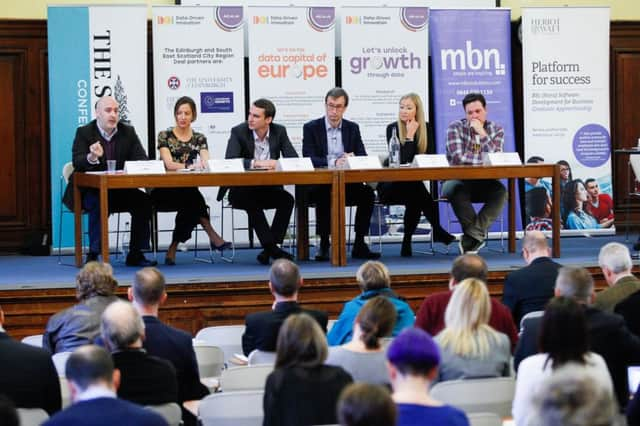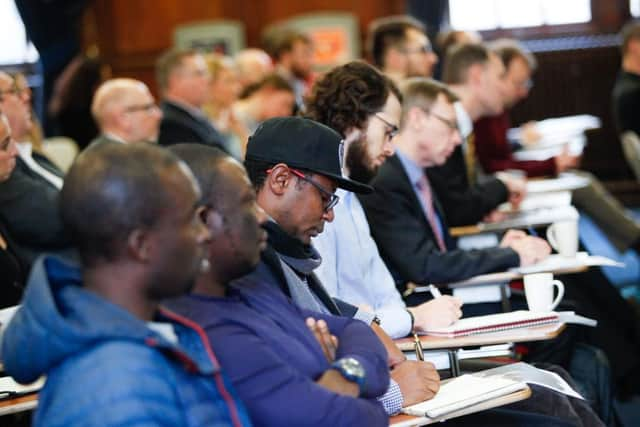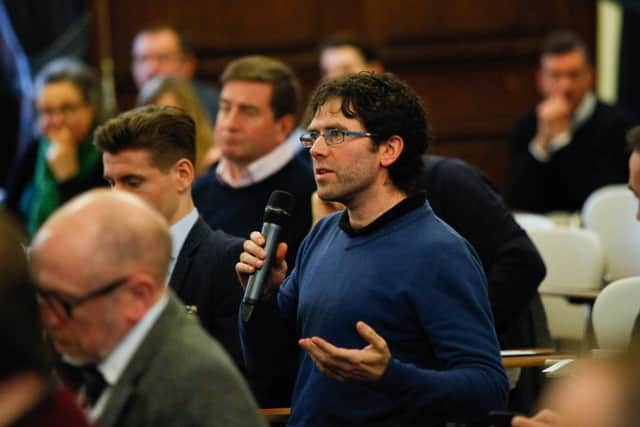Data set to provide £20bn boost to Scotland's economy


That was the view of Scottish Enterprise’s David Smith who spoke at The Scotsman Conference on Data Driven Innovation held in Paterson’s Land at the University of Edinburgh’s Holyrood Campus on Monday.
The event, chaired by Paul Forrest, chairman of MBN Solutions, was part of a series run in partnership with The Scotsman, the University of Edinburgh and Heriot-Watt University to discuss the opportunities presented by the Data Driven Initiative (DDI) component of the Edinburgh and South East Scotland City Regional Deal.
Advertisement
Hide AdAdvertisement
Hide AdThe deal will see a total investment of £661 million to grow the region’s data economy, with 100,000 people set to undergo data skills training during the 15-year project.


David Smith, digital technology and delivery sector director at Scottish Enterprise, told the conference: “Data will bring a £20bn productivity benefit to the Scottish economy if we fully harness the opportunity over the next five years.
“We also need around 12,000 to 13,000 digitally skilled people to fill vacancies that will emerge over the coming years.
“To address this skills gap will need a multifaceted approach to make Scotland as an attractive a destination as possible.


“We are encouraging people who studied in Scotland before leaving to go elsewhere to return and work here.
Smith went on to applaud work already being done to strengthen the country’s digital expertise, citing Edinburgh-based education centre CodeClan.
He said: “There are some excellent initiatives in Scotland at the moment. CodeClan are helping to bridge the skills gap by encouraging people to refresh their skills.
“Companies are also recognising that they need to take action and are investing in growing their own talent.
Advertisement
Hide AdAdvertisement
Hide AdNevertheless, Smith did single out one cause for concern. He told the event: “There has been some progress in bringing women into IT but there is still a massive opportunity there for us.”
Elizabeth Hollinger, head of analytics and BI at Aggreko, said that her company has achieved success through up-skilling, adding that organisations that will be successful in the data economy will be those able to merge new data techniques with the knowledge held by their existing staff.
She said: “We do face a skills gap at the moment, but many companies do not have a plan as to how to address it.
“There is a real benefit in up-skilling people who are historically not data scientists. We have began to work with people from a variety of backgrounds in a collaborative team.
“The people involved get to learn new skills and the business gets the benefit of people who have a deep knowledge of the organisation.”
Trust was flagged as a key issue which will define the success of companies in the data sphere, following a number of high-profile data breaches. This week, taxi firm Uber made the headlines when it was fined £385,000 by the Information Commissioner’s Office for failing to tell 3.7 million of its users in the UK that their data had been hacked in 2016.
David Tracy, chief analytics officer at Glasgow-based Fintech firm Castlight Financial, told the conference that organisations should not forget that it was a privilege to be trusted with private information.
He said: “You have got to remember that it’s not my data it is the customer’s data.
Advertisement
Hide AdAdvertisement
Hide Ad“We specialise in categorising banking data and can see the stories of peoples lives, whether it be buying baby clothes, paying for a funeral or filling up at the petrol station.
“You have to be humble with people’s data and this belief has to be embedded with the culture of your company.”
Ed Broussard, chief executive and co-founder of Mudano, which specialises in machine learning and project management, maintained that the ability of companies to drive business success through data was core to their future survival.
He said: “Being data literate is now essential in business. If you are not, it is the equivalent of not appreciating the role that the internet would play in future economic success in the nineties.
“People and companies who realise the significance of data and machine learning now will be at a distinct advantage. Data is now a driver of economic growth and not using data to drive business decisions does not many any sense.”
But Professor Gareth Peters, from the Department of Actuarial Mathematics and Statistics at Heriot-Watt University, underlined the importance of how that data is dealt with
He said: “As companies collect more data than ever before, they need to ensure that they have the skills to interrogate that data. Do they have a curation expert who can manage the life cycle of their data and ensure that its use remains compliant?”
Jarmo Eskelinen, director of the DDI Initiative, said that it was the aim of the partnership project to break down the silos that can exist within territories. Five innovation hubs will be created between the University of Edinburgh and Heriot-Watt University as part of the DDI scheme.
Advertisement
Hide AdAdvertisement
Hide AdThe Bayes Centre is already open in Potterrow with the Edinburgh Futures Institute, the Usher Institute, Robotarium and a facility at Easter Bush also in the pipeline.
Eskelinen told the conference crowd: “The Bayes Centre is up and running and will serve as the data infrastructure hub connecting all the other hubs together.
“Across these hubs we will do projects in ten sectors – Agritech, creative tech, festivals and tourism, Fintech, financial services, public sector, health and social care, digital tech, space and satellite and robotics.
“Cities tend to work in silos, however, to succeed, universities, business and public bodies will have to co-operate.”
